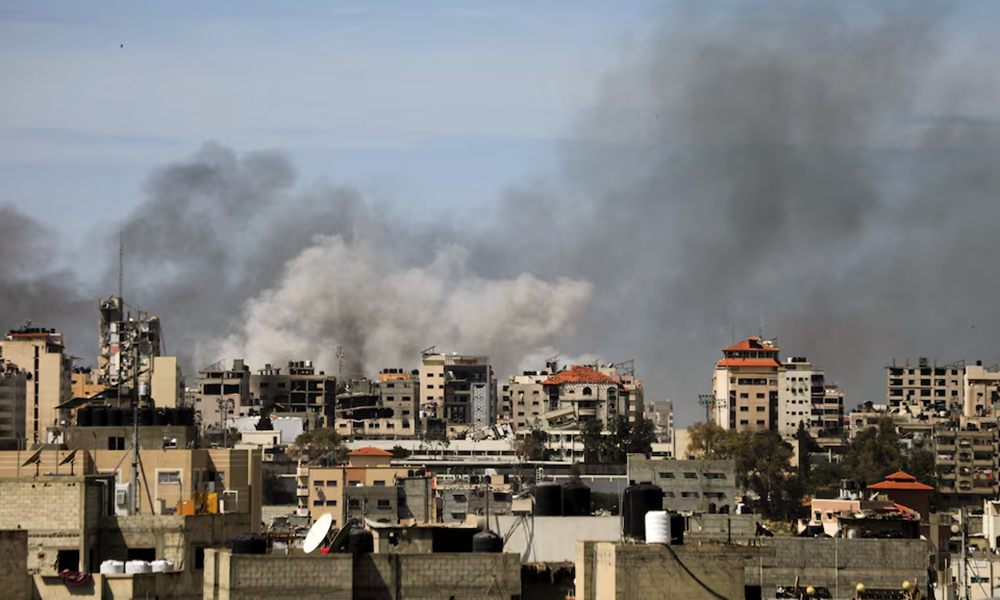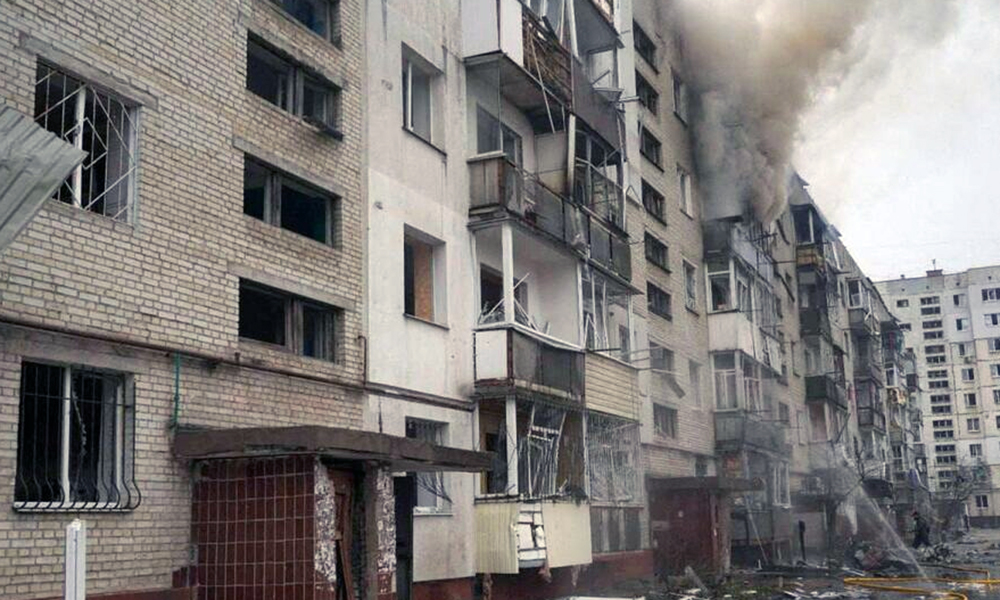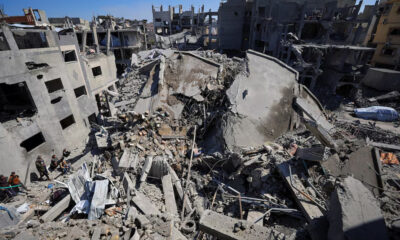World
World Court orders Israel to halt Gaza famine; Hamas says ceasefire needed

The World Court on Thursday unanimously ordered Israel, accused by South Africa of genocide in Gaza, to take all necessary and effective action to ensure basic food supplies to the enclave’s Palestinian population and halt spreading famine, Reuters reported.
But Gaza’s Hamas rulers said a ceasefire was needed to halt the humanitarian crisis.
The order from the International Court of Justice came as Israeli forces and Palestinian fighters battled in close combat around Gaza’s Al Shifa Hospital, where the armed wings of Hamas and Islamic Jihad said they attacked Israeli soldiers and tanks with rockets and mortar fire.
Judges at the court said the people in the coastal enclave face worsening conditions.
“The court observes that Palestinians in Gaza are no longer facing only a risk of famine (…) but that famine is setting in,” the judges said in their order.
The new measures were requested by South Africa as part of its case that accuses Israel of state-led genocide in Gaza, read the report.
Senior Hamas official Basem Naim said the ruling did not go far enough and Israel must be ordered to end its military offensive to halt the suffering.
“We welcome any new demands to end this humanitarian tragedy in Gaza and especially in the northern Gaza Strip, but we hoped the court ordered a ceasefire as an absolute solution to all the miseries our people in Gaza are living through,” Naim told Reuters.
The U.N. Security Council voted on Tuesday to demand an immediate ceasefire and the immediate and unconditional release of all hostages. The United States abstained from, but did not veto, the vote.
There was no immediate comment from Israel’s Foreign Ministry on the World Court ruling. Israel has said it is making efforts to expand access for humanitarian groups to Gaza overland, through air drops and by ship.
Israeli leaders have said Hamas can end the war by surrendering, freeing all hostages it holds in Gaza and handing over for trial those involved in the Oct. 7 attack, Reuters reported.
The Israeli army said it continued to operate around the Al Shifa Hospital complex in Gaza City after storming it more than a week ago. Its forces had killed around 200 gunmen since the start of the operation “while preventing harm to civilians, patients, medical teams, and medical equipment”, it said.
In a televised statement, chief Israeli military spokesperson Rear Admiral Daniel Hagari said troops operating at the hospital killed Raed Thabet, a Hamas quartermaster whom he described as one of the group’s 10 most senior members.
Gaza’s health ministry said wounded people and patients were being held inside an administration building in Al Shifa that was not equipped to provide them with healthcare. Five patients had died since the Israeli raid began due to shortages of food, water and medical care, the Hamas-run ministry said.
Ismail Al-Thawabta, the director of the Gaza Hamas-run government media office, said the Israeli army was carrying out “field killings and executions against hundreds of civilians”, when asked about the army statement.
“Everyone inside the Shifa complex are civilians, and there are no military personnel inside the compound,” he told Reuters.
Al Shifa, the Gaza Strip’s biggest hospital before the war, had been one of the few healthcare facilities even partially operational in north Gaza before the latest fighting. It had also been housing displaced civilians.
Unverified footage on social media showed its surgery unit blackened by flames and nearby apartments on fire or destroyed.
The armed wings of the Hamas and Islamic Jihad militant groups said in a statement they “bombed, with a barrage of mortar shells, gatherings of Israeli soldiers in the vicinity of the Al-Shifa Complex” in a joint operation.
Israel says it is targeting Hamas militants who use civilian buildings, including apartment blocks and hospitals, for cover. Hamas denies doing so.
At least 32,552 Palestinians have been killed and 74,980 wounded in Israel’s military offensive in the Gaza Strip since Oct. 7, the territory’s health ministry said on Thursday, Reuters reported.
Thousands more dead are believed to be buried under rubble and more than 80% of Gaza’s 2.3 million population is displaced, many at risk of famine.
The war erupted after Hamas militants broke through the border and rampaged through communities in southern Israel, killing 1,200 people and abducting 253 hostages according to Israeli tallies.
In Rafah, where more than a million people have been sheltering, health officials said an Israeli airstrike on a house killed at least 12 people.
Israel says it plans a ground offensive into Rafah, in the far south of the enclave, where it believes most Hamas fighters are now sheltering. Its closest ally and main arms supplier the United States opposes such an assault, arguing it would cause too much harm to civilians who have sought refuge there.
Israeli forces also continued to blockade Al-Amal and Nasser hospitals in Khan Younis, in southern Gaza, while several other areas came under Israeli fire, residents said.
The Palestinian Red Crescent said seven people working for the organisation arrested in a raid on Al-Amal hospital on Feb. 9 had been released after 47 days in Israeli prisons.
Among them was the director of ambulance and emergency services in the Gaza Strip, Mohammed Abu Musabeh. Eight members of the association were still being detained, it said in a statement.
Israel said soldiers from its Commando Brigade had arrested dozens of Palestinian militants in the Al-Amal area and discovered explosives and dozens of Kalashnikov-type weapons.
The World Health Organization said Al-Amal Hospital had ceased to function due to fighting, leaving just 10 of 36 hospitals in the Gaza Strip partially operational, read the report.
World
Secretive Chinese network tries to lure fired US federal workers, research shows
Researcher identifies “network of fake consulting and headhunting firms”

A network of companies operated by a secretive Chinese tech firm has been trying to recruit recently laid-off U.S. government workers, according to job ads and a researcher who uncovered the campaign, Reuters reported Wednesday.
Max Lesser, a senior analyst on emerging threats with the Washington-based think tank Foundation for Defense of Democracies, said some companies placing recruitment ads were “part of a broader network of fake consulting and headhunting firms targeting former government employees and AI researchers.”
Little information is publicly available on the four consultancies and recruitment companies allegedly involved in the network, which in some cases shared overlapping websites, were hosted on the same server, or had other digital links, according to Reuters’ reporting and Lesser’s research.
The four companies’ websites are hosted at the same IP address alongside Smiao Intelligence, an internet services company whose website became unavailable during Reuters’ reporting.
Reuters could not determine the nature of the relationship between Smiao Intelligence and the four companies.
The news agency’s attempts to track down the four companies and Smiao Intelligence ran into numerous dead-ends including unanswered phone calls, phone numbers that no longer work, fake addresses, addresses that lead to empty fields, unanswered emails and deleted job listings from LinkedIn.
Lesser, who uncovered the network and shared his research with Reuters ahead of publication, said the campaign follows “well-established” techniques used by previous Chinese intelligence operations.
“What makes this activity significant,” he said, “is that the network seeks to exploit the financial vulnerabilities of former federal workers affected by recent mass layoffs.”
Reuters could not determine if the companies are linked to the Chinese government or whether any former federal workers were recruited.
Asked about the research, three intelligence analysts told Reuters the network appeared to be a prime example of how foreign-linked entities are trying to gather intelligence from staff fired or forced into retirement by President Donald Trump and billionaire tech tycoon Elon Musk’s Department of Government Efficiency.
A spokesperson for the Chinese Embassy in Washington told Reuters in an email that China was unaware of any of the entities allegedly involved in the campaign and Beijing respects data privacy and security.
A White House spokesperson said China was constantly trying to exploit the United States’ “free and open system” through espionage and coercion.
“Both active and former government employees must recognize the danger these governments pose and the importance of safeguarding government information,” the spokesperson said.
One of the companies in the network, RiverMerge Strategies, bills itself on its website as a “professional geopolitical risk consulting company” and posted two since-deleted job listings on its since-removed LinkedIn page in mid-February.
One ad that sought a “Geopolitical Consulting Advisor” with experience with government agencies, international organizations, or multinational corporations, displayed that it had more than 200 applications, according to a screenshot of the LinkedIn post.
The other sought a human resources specialist who could “utilize a deep understanding of the Washington talent pool to identify candidates with policy or consulting experience,” and “leverage connections to local professional networks, think tanks, and academic institutions.”
World
Russian missile attack wounds 88 in Ukraine’s Sumy, officials say
Zelenskiy said Russia was “the only entity prolonging this war and tormenting both our people and the entire world.

A Russian missile attack hit a densely-populated district of Ukraine’s northeastern city of Sumy, wounding 88 people, including 17 children, on Monday as ceasefire talks, ploughed on, officials said.
Regional governor Volodymyr Artiukh announced the latest casualty toll on national television. He said many more children had escaped injury as they had been evacuated to air raid shelters, Reuters reported.
“They were in the area in a densely-populated area hit by the enemy strike,” Artiukh told the television.
“Two schools fell within the impact zone. I was present when our rescuers cleared the locations where the children were. They were in protective structures. All the children were rescued and evacuated to a safe place.”
Several high-rise residential blocks in the city centre were also damaged, read the report.
Artiukh had earlier spoken in a video that he said was shot at the scene with heavy black smoke, fires and a car with shattered windows in the background. Smoke also rose from the upper floors of a five-storey residential block nearby.
Ukrainian President Volodymyr Zelenskiy deplored the attack in his nightly video address as the latest example of “losses, pain and destruction, something Ukraine never wanted.”
The missile struck the city as Russian and U.S. officials met in Saudi Arabia to discuss a possible ceasefire.
Zelenskiy said Russia was “the only entity prolonging this war and tormenting both our people and the entire world.
“To force Russia into peace, strong measures and decisive actions are needed,” he said. “We are ready to support every strong initiative that makes diplomacy more effective.”
Foreign Minister Adrii Sybiha said Moscow was speaking of peace “while carrying out brutal strikes on densely populated residential areas in major Ukrainian cities.”
“Instead of making hollow statements about peace, Russia must stop bombing our cities and end its war on civilians,” Sybiha said.
Acting Sumy mayor Artem Kobzar said on Telegram an industrial facility was attacked but did not name it.
Sumy, about 30 km (20 miles) from the Russian border, comes under constant drone and missile strikes from Russia.
World
Putin and Trump may have spoken more than twice, Kremlin says
Washington Post journalist Bob Woodward in his 2024 book “War” reported that Trump had direct conversations as many as seven times with Putin after he left the White House in 2021.

Russian President Vladimir Putin and U.S. President Donald Trump may have had more contacts than the two publicly announced telephone calls over recent months, the Kremlin said in video footage published by state television on Sunday.
Trump, who says he wants to be remembered as a peacemaker, has repeatedly said that he wants the three-year conflict in Ukraine to end and has warned of the risks of it escalating into a world war between the United States and Russia.
There have so far been two announced phone calls between Putin and Trump this year – on Feb. 12 and on March 18 – though there has been speculation about much more frequent contact, and also reports that they spoke before Trump was elected last year.
When asked by the most prominent Kremlin correspondent for state television about remarks by Trump that indicated there may have been more than two calls, Kremlin spokesman Dmitry Peskov said information had been released about those calls he knew of.
“Listen, we inform you about the conversations that we are aware of. But we can’t rule out everything else,” Peskov said.
State television’s Pavel Zarubin then asked: “So all sorts of nuances are possible as they say?” to which Peskov replied: “Well, that is how I would answer your question.”
The contacts between Trump and Putin have spooked European leaders who fear the United States could be turning its back on Europe in the hope of striking a peace deal with Russia as part of some broader grand bargain encompassing oil prices, the Middle East and competition with China.
Trump told the Washington Examiner, that he had been speaking to the Russian leader for weeks.
Before the contacts with Trump, Putin last spoke to a sitting U.S. president in February 2022, when he and Joe Biden spoke shortly before the Russian leader ordered tens of thousands of troops into Ukraine.
Washington Post journalist Bob Woodward in his 2024 book “War” reported that Trump had direct conversations as many as seven times with Putin after he left the White House in 2021.
Asked if that were true in an interview to Bloomberg last year, Trump said: “If I did, it’s a smart thing.” The Kremlin denied Woodward’s report.
Reuters, The Washington Post and Axios reported separately that Trump and Putin spoke in early November. The Kremlin also denied those reports.
Putin and Trump may have another phone call if Ukraine continues strikes on Russian energy infrastructure, Peskov said.
Putin agreed to the suspension of such attacks in a phone call with Trump last week. Kyiv, which has said it would be willing to take part in such a partial ceasefire if a document setting out its terms is agreed, has accused Russia of not abiding by Putin’s order, something Moscow denies.
“While the Russian side has been sticking to its word for several days now, the word that the president gave, and to the president’s command, which immediately came into force and was immediately implemented, and is still being implemented, the same cannot be said of the Kyiv regime”, Peskov said.
Russia and Ukraine accused each other on Friday of blowing up a Russian gas pumping station in a border area where Ukrainian troops have been retreating. Russia said on Saturday it reserves the right to a “symmetrical response” to Ukrainian attacks on Russian energy facilities.
Asked if Ukraine’s violation of the agreement may become a reason for another Putin-Trump call, Peskov said: “Absolutely. The presidents confirmed their intention to continue contacts as necessary.”
In another clip released on Zarubin’s Telegram channel earlier on Sunday, Peskov said the latest phone call between Putin and Trump was “a step towards a face-to-face meeting”, adding that Russia-U.S. talks in Riyadh scheduled for Monday would also be such a step, Interfax news agency reported.
-

 Latest News5 days ago
Latest News5 days agoAmerican freed by IEA reunited with wife, former cellmate, in US
-

 International Sports4 days ago
International Sports4 days agoBoxing legend George Foreman dies at 76
-

 International Sports3 days ago
International Sports3 days agoRCB bring fireworks to opening night of IPL 2025
-

 Latest News5 days ago
Latest News5 days agoEighteen injured after dispute between two brothers in Helmand
-

 Regional5 days ago
Regional5 days agoHamas studies US ‘bridge’ proposal for truce as Israel escalates return to war
-

 Latest News3 days ago
Latest News3 days agoTorkham border reopens for pedestrians
-

 Latest News5 days ago
Latest News5 days agoBan on girls’ education in Afghanistan will be ‘catastrophic’: UNICEF
-

 International Sports3 days ago
International Sports3 days agoIPL 2025: Sunrisers on a batting rampage; triumph over Rajasthan Royals

























